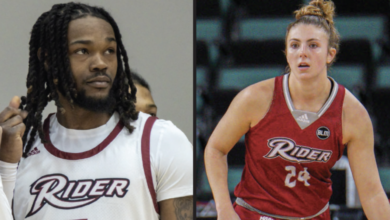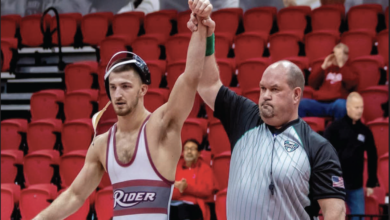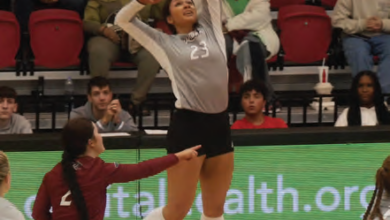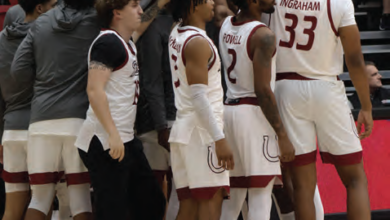
How Rider’s first true legend came to Lawrenceville
By Shaun Chornobroff
Darrick Suber was Rider basketball’s first-ever 2,000 point scorer, a former Northeast Conference (NEC) Player of the Year, Rider Athletics Hall of Fame inductee and the only basketball player to have his number retired by the school until former NBA first-round pick Jason Thompson earned the same honor in 2009.
He was so talented that an article from The Rider News in 1993 dubbed Suber as “The god of Riderbasketball.”
Suber led the team to two conference championship games and sent the men’s basketball team to the NCAA tournament in 1993 by scoring 33 of Rider’s 65 points in the NEC Championship game, which culminated in Suber scoring a historic buzzer- beater, which is now known as “The Shot.”
Suber’s impact on Rider basketball is almost immeasurable, but it almost never happened.
In late August 1989, Suber’s life took a U-turn.
The 6-foot-2 shooting guard had long been signed to play Division I basketball at St. Francis College in Brooklyn, New York, but once his mother saw the living situation the school was housing basketball players, Suber and his mother both had a “gut feeling not to do this.”
He withdrew from the school.
The same night, Suber, the reigning Pittsburgh City League Player of the Year, was stuck in a Manhattan hotel room with his future unclear. He does not remember the name of the hotel, but it is where his life changed forever.
“I remember the rooms being kind of separated, in that I had a section. We weren’t in separate rooms, it was two rooms with a conjoining door,” Suber said. “At some point later that night my mother and step-father had retired for the evening … We had traveled earlier that morning, Pittsburgh to New York City, it probably took us around seven hours. So it was a long day. Now it’s emotional as hell.”
Suber proceeded to call one of his good friends William Kinsel, or “Doodles,” as Suber affectionately refers to him. Kinsel, who Suber had met playing basketball in Pittsburgh, happened to be an incoming freshman on the Rider basketball team.
“I’m racking my brain at this point,” Suber said. “So I made a list of schools that I was interested in, and in doing so remembered that in a trip to Pittsburgh in the summertime coach [Kevin] Bannon and coach [Don] Harnum were at either Five-Star Basketball Camp or Metro Index Basketball Camp, which are both Pittsburgh area exposure camps.”
Kinsel had already been signed to Bannon and Harnum’s team, both of whom were entering their first season in Lawrenceville.
“I remembered ‘Doodles’ saying that they really liked me as a player. So, at this point I’m fishing for anything,” Suber said as he reminisced.
Suber, with his back against the wall, wide awake and stressed in the “City that never sleeps,” he asked his lifelong friend for Bannon’s phone number, in need of a lifeline.
“At 18, sitting in the heart of Manhattan, I made what was my first cold call ever,” Suber explained.
“I just call coach Bannon. It’s probably eight or nine o’clock at night. I had never spoken to him and had never met him. I introduced myself, explained how I got his number and explained the situation. And the phone is just eerily silent and I’m starting to hang my head a little bit,” Suber said, getting “choked up,” about a transformational moment in his life.
“[Bannon] was very receptive to what was going on and wanted to meet me and try and figure this out,” Suber said graciously
Sitting in his hotel room, Suber seemed to be on his way to fixing his predicament but needed to tell his mother of the phone call with Bannon.
“The next day I explained this to my mom and she’s looking at me like I’m crazy,” Suber said. “She had never heard of Rider, and she damn sure never heard of Lawrenceville, New Jersey.”
Suber has gained a new appreciation for this conversation now that he’s a father saying, “I can’t imagine how crazy I sounded.”
Suber and his family left Manhattan the next day.
He admits to falling asleep almost immediately after leaving the hotel, but in a twist of fate, the family stopped at a rest stop on the New Jersey Turnpike.
“I’m walking to the bathroom of the rest stop, and this is 1989, there’s half a wall of payphones. I walk by and I just happen to see a 609 area code,” Suber said. “So I dropped a quarter in and called coach Bannon. Turns out he and Coach Harnum had been waiting by the phone to hear if we were coming. He told me to stay there, and about a half an hour later he shows up at the rest stop.”
Suber stayed one more night in New Jersey and by the time Kinsel showed up the next day to move in, Suber was enrolled at Rider because of a school policy that allowed students to apply to be accepted at any time up until the first day of class.
The story of Suber getting to Rider is great, but the reason they had a scholarship left for him makes his story even better.
Bannon and Harnum had accepted a difficult rebuilding process. The two had previously been coaches at The College of New Jersey and had consistently beaten a Rider team who was coming off of a 5-23 season and in desperate need of talent.
“We had limited scholarships because we inherited a team that was fairly young, so we didn’t have a lot of room to maneuver right away,” Harnum said. “We had a combo player. Kid’s name was Mel Edwards, who was the starting point guard the year before, but also played on the baseball team, but was on a basketball scholarship… In August right before we were going to bring kids to campus, Edwards decided that he was no longer going to play basketball and he was going to concentrate on baseball.”
This turned out to be a mutually beneficial situation for Edwards and Rider basketball. Edwards was drafted in the 42nd round of the 1991 MLB Draft by the San Diego Padres and had a short stint in the minor leagues and it allowed Rider to land a “stone cold killer” who transformed the program.
“We were going to get better. There was no doubt about that,” Harnum said. “But in order to actually win a championship and get towards the top of the league, you need a special player too. And when your program’s reputation isn’t that good, it’s hard to get those kinds of guys.”
In unusual and lucky circumstances, Bannon and Harnum were able to get that guy that helps build a program and set a tone for success that continues until this day.



